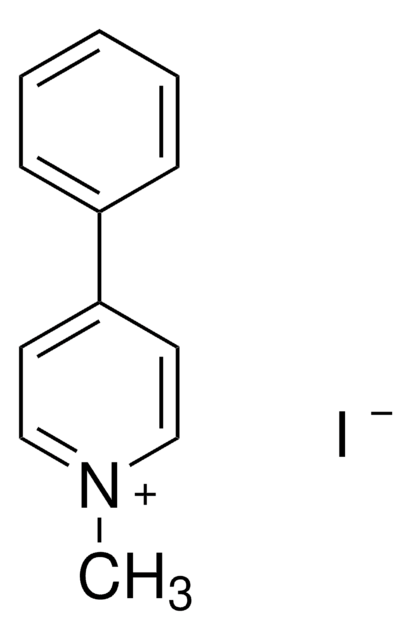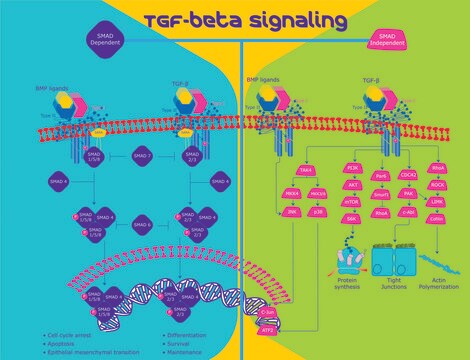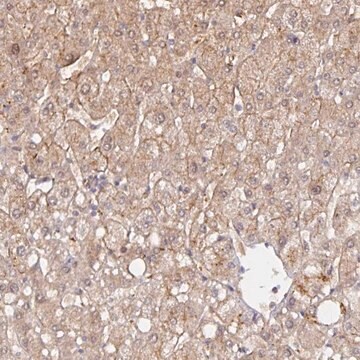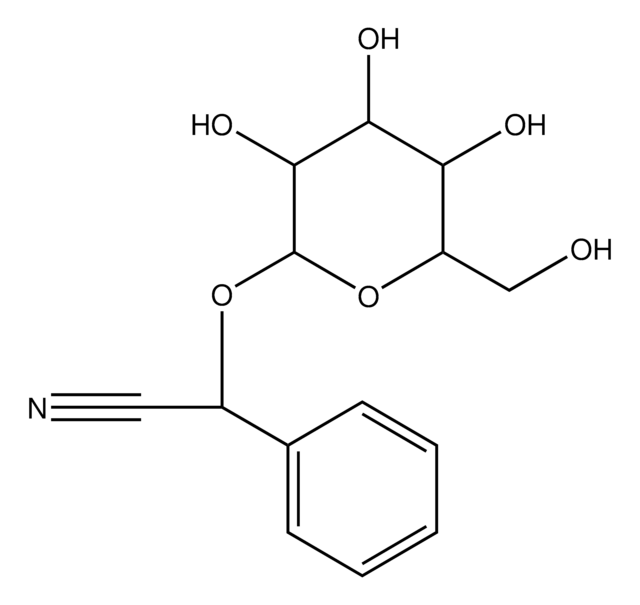M103
1-Methyl-4-(2′-methylphenyl)-1,2,3,6-tetrahydropyridine hydrochloride
solid
Sinônimo(s):
2′-Methyl-MPTP hydrochloride
Faça loginpara ver os preços organizacionais e de contrato
About This Item
Fórmula empírica (Notação de Hill):
C13H17N · HCl
Número CAS:
Peso molecular:
223.74
Número MDL:
Código UNSPSC:
12352200
ID de substância PubChem:
NACRES:
NA.77
Produtos recomendados
Formulário
solid
cor
white
solubilidade
H2O: soluble
ethanol: soluble
cadeia de caracteres SMILES
Cl[H].CN1CCC(=CC1)c2ccccc2C
InChI
1S/C13H17N.ClH/c1-11-5-3-4-6-13(11)12-7-9-14(2)10-8-12;/h3-7H,8-10H2,1-2H3;1H
chave InChI
QLIQCKBPYIWPTE-UHFFFAOYSA-N
Aplicação
1-Methyl-4-(2′-methylphenyl)-1,2,3,6-tetrahydropyridine hydrochloride has been used to study its effect on core temperature in C57BL/6J mice.
Ações bioquímicas/fisiológicas
1-Methyl-4-(2′-methylphenyl)-1,2,3,6-tetrahydropyridine hydrochloride (MPTP) is a tertiary amine. It is widely used to induce experimental parkinsonism in mice.
Palavra indicadora
Danger
Frases de perigo
Declarações de precaução
Classificações de perigo
Acute Tox. 3 Oral
Código de classe de armazenamento
6.1C - Combustible acute toxic Cat.3 / toxic compounds or compounds which causing chronic effects
Classe de risco de água (WGK)
WGK 3
Equipamento de proteção individual
Eyeshields, Faceshields, Gloves, type P2 (EN 143) respirator cartridges
Escolha uma das versões mais recentes:
Já possui este produto?
Encontre a documentação dos produtos que você adquiriu recentemente na biblioteca de documentos.
Os clientes também visualizaram
C Gagnon et al.
Neuroscience letters, 163(1), 31-35 (1993-11-26)
Four monkeys were rendered parkinsonian by N-methyl-4-phenyl-1,2,3,6-tetrahydropyridine (MPTP) i.v. administration and then treated chronically with increasing doses of the D1 agonist CY 208-243 (0.05, 0.1 and 0.5 mg/kg). All animals showed a dose-dependent improvement of their parkinsonian signs after the
S K Youngster et al.
Journal of neurochemistry, 48(3), 929-934 (1987-03-01)
Several analogs of 1-methyl-4-phenyl-1,2,3,6-tetrahydropyridine (MPTP) were synthesized and screened for their capacity to be oxidized by monoamine oxidase (MAO-A or MAO-B) and their capacity to produce nigrostriatal dopaminergic neurotoxicity in mice. All of the compounds were relatively weak substrates for
R Srivastava et al.
Neurobiology of aging, 14(4), 295-301 (1993-07-01)
1-methyl-4-phenyl-1,2,3,6-tetrahydropyridine, (MPTP), produces a parkinsonian syndrome both in man and in experimental animals. Its toxicity is mediated by a metabolite, the 1-methyl-4-phenylpyridinium ion (MPP+). When injected into the striatum, MPP+ is accumulated by dopaminergic nerve terminals and retrogradely transported to
D E Dluzen et al.
Brain research, 609(1-2), 98-102 (1993-04-23)
Male mice treated with MPTP or vehicle were tested for their ability to demonstrate a memory-recognition response as evaluated in a habituation-dishabituation task. Treatment with MPTP severely disrupted the male's habituation-dishabituation response profile compared to vehicle treated animals. Administration of
E H Lee et al.
Neuroscience letters, 165(1-2), 149-152 (1994-01-03)
The interactive effects of clorgyline, deprenyl and 1-methyl-4-phenyl-1,2,3,6-tetrahydropyridine (MPTP) on striatal dopamine (DA), serotonin (5HT) and hippocampal norepinephrine (NE) were examined in the present study. Results indicated that clorgyline did not have a preventive effect against MPTP's toxicity on DA
Nossa equipe de cientistas tem experiência em todas as áreas de pesquisa, incluindo Life Sciences, ciência de materiais, síntese química, cromatografia, química analítica e muitas outras.
Entre em contato com a assistência técnica









